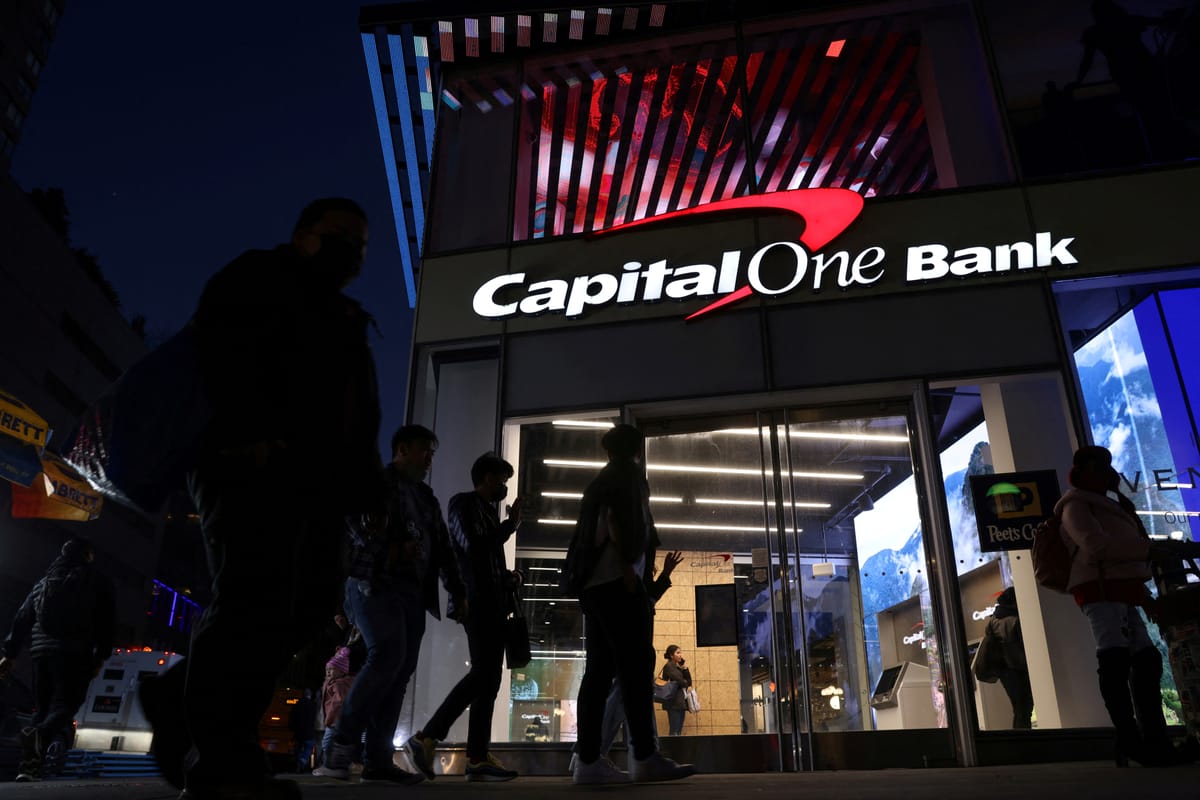Capital One to acquire Discover Financial for US$35.3 billion
Capital One announced plans to buy Discover in a deal worth US$35.3 billion.

A few minutes every morning is all you need.
Stay up to date on the world's Headlines and Human Stories. It's fun, it's factual, it's fluff-free.
The backstory: In the US, there's been ongoing debate about whether big banks should be allowed to get even bigger. The discussion intensified last year when major banks started buying up failing ones, like when JPMorgan snagged First Republic Bank. Back in 2021, US President Joe Biden signed the Executive Order on Promoting Competition in the American Economy, which, among other topics, urged regulators to take a close look at these mergers. In response, the Justice Department said it would be checking mergers more carefully for any antitrust problems, while the Office of the Comptroller of the Currency proposed slowing down merger approvals and making the process more transparent. At the same time, the Consumer Financial Protection Bureau also wanted stricter regulations on credit card fees.
Now, in the midst of all this, there are two major players: Discover Financial Services and Capital One. Discover has been around since the mid-’80s, offering a range of financial services, although it's not as massive as Visa or Mastercard. On the other hand, you've got Capital One, valued at about US$52 billion and backed by household-name investor Warren Buffett. According to Nilson, Capital One is ranked fourth in the US credit card market, with Discover behind in sixth place.
More recently: Discover has been under the microscope in the last year, especially for how it categorized certain credit card accounts all the way back to mid-2007. Regulators were digging into this, and Discover had to agree to tighten up its game when it comes to following consumer rules and corporate governance. The scrutiny led to its shares tanking and the CEO stepping down. In January, Discover posted a 62% drop in fourth-quarter profit as it continued to deal with the fallout from its compliance issues.
The development: Capital One announced plans to buy Discover in a deal worth US$35.3 billion. This deal would create the sixth-largest US bank by assets, putting it in direct competition with giants like JPMorgan and Citigroup. Under this agreement, Discover shareholders are set to get more than one share of Capital One for each Discover share they own, which is quite a jump – about 27% higher than Discover's recent share price. After the deal, Capital One's current shareholders will own 60% of the new company, while Discover shareholders will hold onto the remaining 40%. If all goes according to plan and regulators give the green light, we should see this deal wrapped up by late 2024 or early 2025.
Key comments:
"This acquisition adds scale and investment, enabling the Discover network to be more competitive with the largest payments networks," the companies said in a statement.
“Employee compensation and professional fees were up due to investments in compliance and risk management,” Discover said in its earnings statement in January.
“Through this combination, we’re creating a company that is exceptionally well-positioned to create significant value for consumers, small businesses, merchants, and shareholders as technology continues to transform the payments and banking marketplace,” Capital One founder and CEO Richard Fairbank said in a statement.
"Bank competition affects the interest you earn on your savings account, the monthly payment on your mortgage or your car loan, or the fees you pay to withdraw cash from an ATM," said Jonathan Kanter, the DOJ's assistant attorney general for antitrust, in a speech at the Brookings Institution. "Market realities have shifted, and when we apply the law, we have an obligation to ensure we are addressing the world as it exists today,"
"You have two risks with mergers: One risk is that we approve too many mergers and therefore we're approving bad mergers. The other risk is we approve too few mergers and therefore there are good mergers that should happen that aren't," said Michael Hsu, the acting comptroller of the Office of the Comptroller of the Currency to Reuters. "The purpose of being transparent is to encourage more accuracy on both ends."




Comments ()